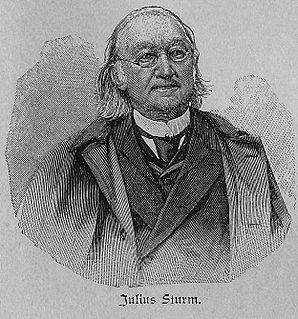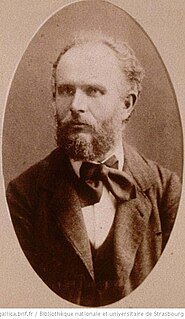Related Research Articles
Sextus Julius Africanus was a Christian traveler and historian of the late second and early third centuries. He is important chiefly because of his influence on Eusebius, on all the later writers of Church history among the Church Fathers, and on the whole Greek school of chroniclers.
Nikephoros Kallistos Xanthopoulos, Latinized as Nicephorus Callistus Xanthopulus, of Constantinople, the last of the Greek ecclesiastical historians.
Phocylides, Greek gnomic poet of Miletus, contemporary of Theognis of Megara, was born about 560 BC.

Philo of Alexandria, also called Philo Judaeus, was a Hellenistic Jewish philosopher who lived in Alexandria, in the Roman province of Egypt.
John Tzetzes was a Byzantine poet and grammarian who is known to have lived at Constantinople in the 12th century.
Albinovanus Pedo was a Roman poet who flourished during the Augustan age.

Jean Antoine de Baïf was a French poet and member of the Pléiade.
Marcus Furius Bibaculus, was a Roman poet, who flourished during the last century of the Republic.
Philo of Byblos, also known as Herennius Philon, was an antiquarian writer of grammatical, lexical and historical works in Greek. He is chiefly known for his Phoenician history assembled from the writings of Sanchuniathon.

Julius Sturm, German poet, was born at Köstritz in the principality of Reuss.

Georg Philipp Harsdörffer was a Baroque-period German poet and translator.
Hermippus was the one-eyed Athenian writer of the Old Comedy, who flourished during the Peloponnesian War.

Euphorion of Chalcis was a Greek poet and grammarian, born at Chalcis in Euboea about 275 BC.

Ernst Laas was a German positivist philosopher.

Tarafa, was a 6th century Arabian poet of the tribe of the Bakr. He is one of the seven poets of the most celebrated anthology of ancient Arabic poetry, known as the Mo'allakat, however just one of his poems is included. His fellow poets preserved in this work are Al-Nabigha, Antarah ibn Shaddad, Zuhayr bin Abi Sulma, 'Alqama ibn 'Abada and Imru' al-Qais.
Choerilus of Samos was an epic poet of Samos, who flourished at the end of the 5th century BC.

Aemilius Macer of Verona was a Roman didactic poet. He authored two poems, one on birds (Ornithogonia), a translation of a work by Boios, and the other on the antidotes against the poison of serpents (Theriaca), which he imitated from the Greek poet Nicander of Colophon. According to Jerome, he died in 16 BC. It is possible that he wrote also a botanical work. The extant hexameter poem known as Floridus or De viribus herbarum, traditionally ascribed to Macer, is actually a medieval production by Odo Magdunensis, a French physician.
Academic skepticism refers to the skeptical period of ancient Platonism dating from around 266 BC, when Arcesilaus became scholarch of the Platonic Academy, until around 90 BC, when Antiochus of Ascalon rejected skepticism, although individual philosophers, such as Favorinus and his teacher Plutarch, continued to defend skepticism after this date. Unlike the existing school of skepticism, the Pyrrhonists, they maintained that knowledge of things is impossible. Ideas or notions are never true; nevertheless, there are degrees of plausibility, and hence degrees of belief, which allow one to act. The school was characterized by its attacks on the Stoics, particularly their dogma that convincing impressions led to true knowledge. The most important Academics were Arcesilaus, Carneades, and Philo of Larissa. The most extensive ancient source of information about Academic skepticism is Academica, written by the Academic skeptic philosopher Cicero.

Aristobulus of Alexandria also called Aristobulus the Peripatetic and once believed to be Aristobulus of Paneas, was a Hellenistic Jewish philosopher of the Peripatetic school, though he also used Platonic and Pythagorean concepts. Like his successor, Philo, he attempted to fuse ideas in the Hebrew Scriptures with those in Greek thought.
References
- This article incorporates text from a publication now in the public domain : Chisholm, Hugh, ed. (1911). "Philo (poet)". Encyclopædia Britannica (11th ed.). Cambridge University Press. This work in turn cites:
- M. Philippson, Ezechiel des jüdischen Trauerspieldichters Auszug aus Egypten und Philo des Aelteren Jerusalem (Berlin, 1830).